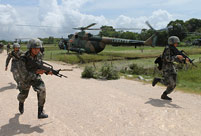Edited and translated by Liang Jun
U.S. President Barack Obama stated on August 23 that the Syrian civil war has affected U.S. "core national interests". The U.S. Department of Defense is also preparing military options for intervention in Syria. It seems that the storm is coming. But looking at the current situation, conditions are not yet ripe for the U.S. to use force in Syria.
Ten years ago, when the United States launched the war in Iraq in 2003, it was already planning military intervention in Syria. With the issue of alleged use of chemical weapons in Syria continuing to simmer, the U.S. position and its possible courses of action are once again attracting world attention.
Currently, the following factors will probably influence Obama's next step in Syria.
The first is geostrategic interests. Syria is known as "the heart of the Middle East". Overthrowing the Syrian government would mean removing the last Russian stronghold and eliminating the last Iranian ally in the region. The U.S. and its main allies have effectively reached a consensus on military intervention in Syria, but considering that Russia and Iran are active supporters of the Assad administration, Obama needs to consider carefully whether a showdown with Russia would be a price worth paying.
The second is related to the "moral mission". In recent years, humanitarian crises and terrorism have been the two major grounds for U.S. military action in other countries, with a U.N. mandate as the "due process". America's current position is that the Syrian government is guilty of using chemical weapons, but this claim remains to be evidenced by the United Nations investigation team.
Public opinion is another important reference point for Obama's decision-making. During the war in Kosovo, 64 percent of Americans believed that the United States was living up to its "moral responsibility"; during the Iraq war, President Bush's public support rate was above 70 Percent. However, a recent poll showed that about 60 percent of Americans think Washington should not intervene in the Syrian conflict.
In addition, the economic cost and benefit analysis cannot be ignored.
Syria is a relatively resource-poor country. Confronted by the forces of the Syrian government, the performance of Syria's armed opposition has been lackluster. The relative strength of the two sides in the civil war will directly determine the costs of intervention and reconstruction. The example of Iraq highlights the fact that the nations which lead the military intervention will not necessarily be the beneficiaries of economic reconstruction. Obama, struggling to fund his defense and other public spending commitments, will have to deliberate carefully.
America's own assessment of the current situation in Syria indicates that the time is not yet ripe for Obama to use military force. To some extent the aggressive military rhetoric of the U.S. may stem from a hope to induce change through pressure, an intention to seek future opportunities, a need to appease the mood of domestic hawks, and a preference for applying preventive measures as far as this is possible.
Read the Chinese version: 美国对叙利亚动武,可能吗
 Weekly selection of world photos (Aug.19-Aug.24)
Weekly selection of world photos (Aug.19-Aug.24) Army aviation brigade in actual-troop drill
Army aviation brigade in actual-troop drill Top 10 Chinese provinces for the well-heeled
Top 10 Chinese provinces for the well-heeled  Fan Bingbing poses for Malaysian magazine Citta Bella
Fan Bingbing poses for Malaysian magazine Citta Bella Wild dream: Hell-like training for bodyguard
Wild dream: Hell-like training for bodyguard  Zhang Xinyi covers COSMOPOLITAN
Zhang Xinyi covers COSMOPOLITAN The story of a savior sibling
The story of a savior sibling China’s weekly story
China’s weekly story  A collection of bizarre rooftop buildings around China
A collection of bizarre rooftop buildings around China 100th birthday of 'Little Mermaid'
100th birthday of 'Little Mermaid' China, U.S. conduct joint anti-piracy drill
China, U.S. conduct joint anti-piracy drill  Adorable! Marmots get along well with herdsmen
Adorable! Marmots get along well with herdsmen 2013 Taiwan Int'l Tourism Expo kicks off in Taipei
2013 Taiwan Int'l Tourism Expo kicks off in Taipei Photo story: Take a gap year
Photo story: Take a gap year Nokia's Global Headquarters: visiting a declining empire
Nokia's Global Headquarters: visiting a declining empireDay|Week|Month